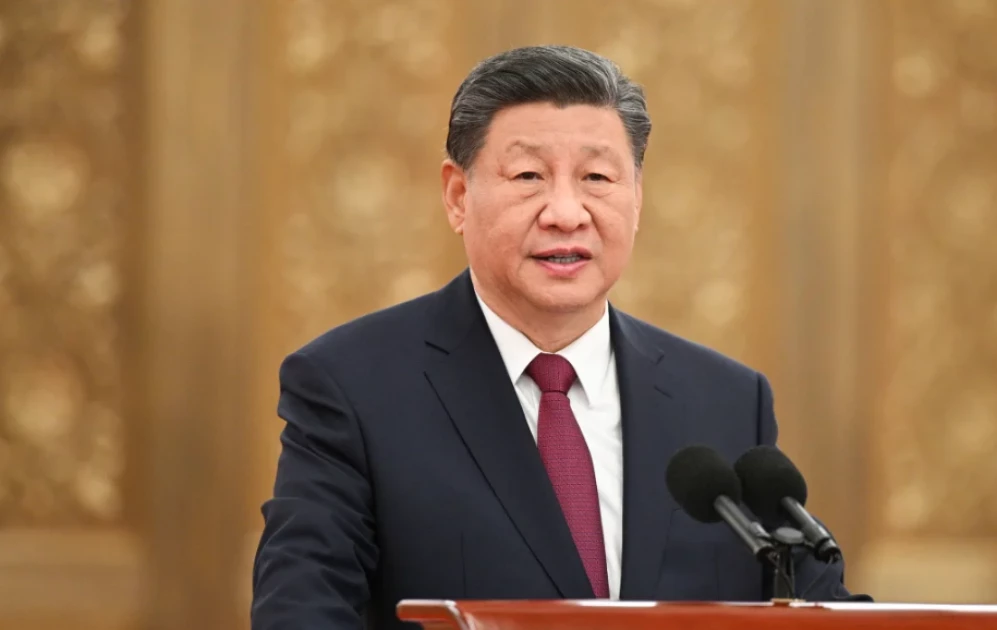Xi Jinping Rings In 2024 With Rare Admission That China’s Economy Is In Trouble
President Xi Jinping recognized in his New Year’s Eve speech that businesses in China are facing challenges, and individuals looking for employment are encountering difficulties in finding jobs.
This marks the initial instance where Xi has addressed economic difficulties in his yearly New Year’s speeches since he commenced delivering them in 2013. This statement arrives at a crucial moment for the world’s second-largest economy, which is facing a structural deceleration characterized by diminished demand, increasing joblessness, and a significant decline in business optimism.
Acknowledging the “headwinds” facing the country, Xi admitted in the televised speech: “Some enterprises had a tough time. Some people had difficulty finding jobs and meeting basic needs.”
“All these remain at the forefront of my mind,” Xi said in remarks which were also widely circulated by state media. “We will consolidate and strengthen the momentum of economic recovery.”
Just before Xi addressed the audience, the National Bureau of Statistics (NBS) released its regular Purchasing Managers’ Index (PMI) report for the month. The report revealed a drop in factory operations for December, marking the lowest point in six months.
According to an announcement from the NBS, the manufacturing PMI fell to 49 last month, decreasing from 49.4 in November.
A PMI score higher than 50 signifies growth, whereas any score below this threshold indicates a decline. December also signaled the third consecutive month of decrease in the manufacturing PMI.
Manufacturing downturn
The nation’s substantial manufacturing industry had been in a state of vulnerability throughout 2023. Following a temporary increase in economic productivity in the initial quarter of the previous year, the authorized manufacturing Purchasing Managers’ Index (PMI) experienced a decline for five consecutive months until September. Subsequently, it fell below the threshold of 50 once more.
This year, China’s economy has been troubled by several issues, such as a prolonged decrease in property values, exceptionally high rates of unemployment among young people, persistently low prices, and increasing financial pressure on local governments.
Beijing is urgently trying to stimulate economic growth and boost job opportunities. They introduced numerous supportive actions last year and pledged to enhance fiscal and monetary policies in 2024.
ALSO READ:
- Under and Over 7 — when the rules are simple, but the emotions are intense
- CAF Trophy Hunt: Win iPhone, MacBook, PlayStation, and other prizes in 1xBet promo!
- Rigathi Gachagua Responds to Raila Odinga’s Claim That He Can’t Fix Kenya’s Problems
- Miguna Miguna Criticizes New IEBC Chair Erastus Ethekon, Calls Him a Ruto Ally- ‘Not Independent’
- Matiang’i: No Scores to Settle, I Just Want to Fix My Country
However, its growing inclination toward more centralized control of the economy, prioritizing the party-state’s dominance over economic and social matters while overshadowing the private sector, has unnerved entrepreneurs. Moreover, the government’s actions to suppress businesses under the guise of national security have deterred foreign investors.
On Saturday, China’s People’s Bank declared its approval of an application to eliminate dominant stakeholders at Alipay, the widely-used digital payment service operated by Jack Ma’s Ant Group. This decision signifies Ma’s formal relinquishment of control over the company he helped establish.
Last January, Ma, who co-established Alibaba Group, announced his decision to step away from overseeing Ant as well as his online ventures, marking his withdrawal. His enterprises were among the initial subjects of Beijing’s extraordinary crackdown on Big Tech, seen as having accumulated excessive power in the view of the Communist Party.
Tough on Taiwan
Xi also pledged that the Chinese mainland would be “reunified” with Taiwan, reiterating Beijing’s long-held stance on the self-ruled island democracy, with a strongly worded comment ahead of a crucial election there.
“China will surely be reunified, and all Chinese on both sides of the Taiwan Strait should be bound by a common sense of purpose and share in the glory of the rejuvenation of the Chinese nation,” Xi said during a section of his speech dedicated to his plans for China’s modernization and development.
The remarks were made a mere fortnight before Taiwan’s presidential elections scheduled for January 13. They conveyed a more direct stance compared to his previous New Year’s speech from the previous year.
Then, Xi said: “The people on both sides of the Taiwan Strait are members of the same family. I sincerely hope that our compatriots on both sides of the Strait will work together with a unity of purpose to jointly foster lasting prosperity of the Chinese nation.”
Xi has made taking control of Taiwan a cornerstone of his broader goal to “rejuvenate” China to a position of power and stature globally. China’s Communist Party claims Taiwan as its own territory, despite never having controlled it, and has not ruled out using force to take the island.
Taipei has alleged that the party is conducting influence activities before the election, wherein Vice President Lai Ching-te, a candidate openly disliked by Beijing, is perceived as a leading contender.
Xi Jinping Rings In 2024 With Rare Admission That China’s Economy Is In Trouble
